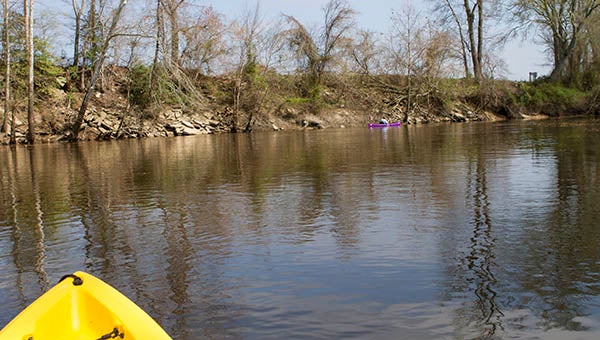Floating down stream
Published 10:37 am Friday, April 10, 2015

Floating along the Nottoway, it’s easy to notice where the touch of humans has cut away some of the ruggedness our forefathers might have glimpsed. — Cain Madden | Tidewater News
For the first time in a long while, I hopped aboard a kayak on Wednesday and floated down a river.
Ever since I was a child, boats have fascinated me. My family was not very into the great watery outdoors, but I did take every opportunity I could elsewhere to venture out onto a river or lake.
One time, with the help of some friends, I flipped a metal boat on a pond and had to swim it back to shore. That headache was deserved, as we had been stupid. At least, I can’t characterize shooting bottle rockets and roman candles at each other as the most intelligent way to spend your time. The land team won, in case you were curious.
It had been at least a decade since I had been in control of a boat. The opportunity never really presented itself with schedules being what they are.
I had forgotten everything. Added to the fact that I was never really formally taught. It was more like: “Here is a canoe, here is a paddle, and there’s a pond. Have fun.”
I certainly did, and I admit to having enjoyed being on the Nottoway River, as well, though I did hit more obstacles than I missed.
Trying to battle against the current to go back was a struggle. Going with the current, on the other hand, was peaceful. You could hear the sploosh of the water as fish jumped, the call of the birds and even the woosh of the wind going through the trees.
Ah, the trees. In that almost contemplative state, it was difficult to not think about an article The Tidewater News had recently published on the logging and wood industry of the area.
In some spots, the forest was so dense on the side of the river that you could not see the sky through it. Meanwhile, on the opposite shore, that familiar blue was all the eye could see.
For the most part, the treeline near the banks of the river was intact. But it was just an illusion of the true ruggedness of land untouched by man. Not far into it, it’s no challenge to see the sky, or even the sandy ground where a forest had been clearcut almost to the banks.
Landowners, of course, do have the right to do that. There’s a buffer along the river, but beyond that, cutting is up to whoever owns the property the trees are on.
Their fathers and grandfathers likely did the same thing, selling it to whatever logger pays the most. The loggers turn around and sell it to whoever on the market will give them the best offer.
It’s the way it has always been, and it’s the way it will continue to be for the foreseeable future.
And they absolutely should have that right, as long as it is done responsibly. The wood-driven industry is very important to Franklin. It’s so important that without it, Western Tidewater would look completely different, and likely not for the better.
Landowners should be allowed to cut trees. Their rights just have to be balanced with the rights of the river-goers, and more importantly, the future.
When planning for our deaths, we always think about our children. Everyone wants to leave their children better off than they were economically, spiritually or whatever descriptor we care most about.
For our children, the Blackwater and Nottoway Rivers will likely still be here as they currently are. Some native flora and fauna may die out in favor of more invasive alien plant species, but it’s hard to envision it too different.
Still, it’s even more difficult to imagine what future we might be setting up for later generations. Do we want our great-grandchildren to able to float down the river in peace? Or should they live in a world where they may have to pay to visit a theme park, which has preserved the world as it once was for that experience?
Cain Madden is the managing editor of The Tidewater News. He can be reached at 562-3187 or cain.madden@tidewaternews.com

